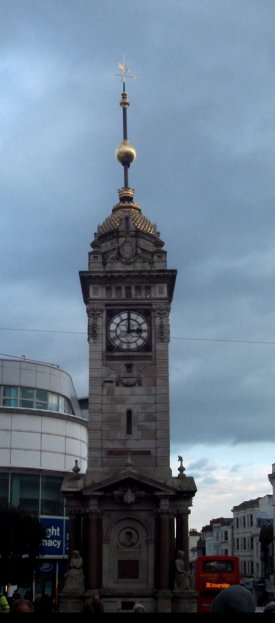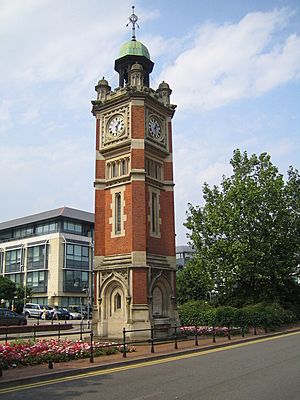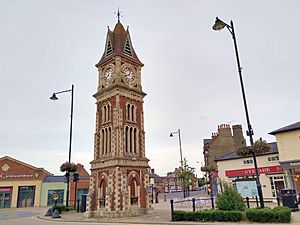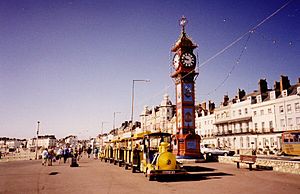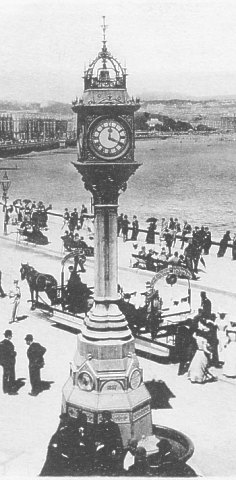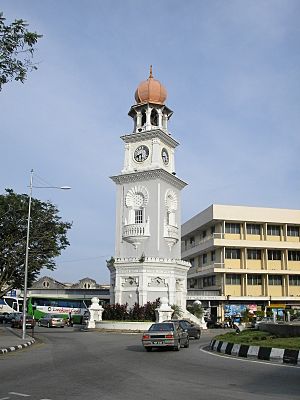Jubilee clock facts for kids
A Jubilee clock is a special clock built to celebrate an important anniversary of a British monarch's reign. These clocks were often put up across the British Empire. Most of them honor Queen Victoria's Golden Jubilee (50 years) or Diamond Jubilee (60 years) on the throne.
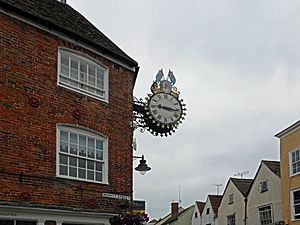
Contents
Jubilee Clocks in England
Brighton's Clock Tower
The Brighton Clock Tower is also known as the Jubilee Clock Tower. It stands in Brighton, England, where West Street and Queens Road meet. It was built in 1888 to celebrate Queen Victoria's Golden Jubilee.
The tower is made of pink granite and limestone. It has limestone figures at each corner. You can also see mosaic pictures of Queen Victoria, Prince Albert, and the Prince and Princess of Wales.
Above the clock is a shiny copper ball called a time ball. This ball goes up a pole every hour and then drops exactly on the hour. For many years, this part of the clock was not used because people living nearby complained about the noise. It was fixed and started working again in 2002.
Cricklade's Jubilee Clock
The Cricklade Jubilee clock is found outside the Vale Hotel in Cricklade. It is at the corner of Calcutt Street and the High Street.
Harlesden's Jubilee Clock
Harlesden is an area in London. A Jubilee Clock was put up there in 1888. It also celebrated Queen Victoria's Jubilee from the year before.
This clock was made from cast iron and cost £299. It was repaired and updated in 1997.
Maidenhead's Clock Tower
The Jubilee Clock Tower in Maidenhead, Berkshire, England, is right outside the train station in the town center. It was built as part of the country's celebrations for Queen Victoria's Diamond Jubilee in 1897.
Building began in 1897 using money donated by the public. The first stone was laid by the mayor, John Truscott, on November 7, 1899. A local architect named E. J. Shrewsbury designed the tower. The clock tower was built by Charles Cox & Son.
The tower is about 14 meters (45 feet) tall. It has four clock faces that light up and point in all four directions. A special diamond pattern on the clock faces reminds everyone that it celebrates the Diamond Jubilee. The clocks were given by Mr. G. A. Battcock. They were made by Smith of Derby Group.
Most of the tower is made of red brick, which was common for houses in the area at that time. There is fancy stonework near the top, just below where the bells are. All the clocks and bells still work today.
Newmarket's Clock Tower
The Newmarket Clock Tower is at the top of the High Street. A local builder, Richard Arber, built it to celebrate Queen Victoria’s Golden Jubilee in 1887. People donated money to pay for the tower. However, a local horse trainer, Charles Blanton, gave the clock itself, which was made by Smith of Derby Group. The clock tower officially opened in 1890. It needs 115 turns to be fully wound up every week.
Thornford's Jubilee Tower
In 1897, the village of Thornford decided to celebrate Queen Victoria's Diamond Jubilee. They put up a Jubilee tower clock. It even had a water tap at its base.
The clock tower was finished by Christmas 1898. A clock made by Richard Robert Purchase, a jeweler from Yeovil, was put inside. A weather vane made by local blacksmith Albert Gabe was added to finish the monument. A Lime tree and a privet hedge were planted behind the tower. Iron railings with kissing gates were put at the front.
Weymouth's Jubilee Clock
The Jubilee Clock in Weymouth was built in 1887. It marked 50 years of Queen Victoria's rule. It was first placed on a stone base on Weymouth sands. In the 1920s, the Esplanade was built around it. This helped protect the sands from shingle moving in from the beach. It is now a Grade II listed building, which means it is an important historic structure.
This clock is one of Weymouth's most loved landmarks. It has been a meeting spot for many people, both locals and visitors, for generations. It is also a main gathering place for Weymouth's New Year's Eve celebrations. People gather under its four faces to welcome the New Year.
Jubilee Clocks in the Isle of Man
A Jubilee Clock is in Douglas, the capital of the Isle of Man. G.W. Dumbell donated it in 1887. It celebrated Queen Victoria's Golden Jubilee. It stands at the bottom of Victoria Street and Loch Promenade.
The clock was made by Walter Macfarlane & Co. in Glasgow. There is only one other known clock that looks exactly like it. That clock is the Hastings Clock in Rotherham, England, built in 1912.
An old photo from around 1900 shows that the clock originally had a horse trough. It also had a drinking fountain with a plaque of Queen Victoria above it.
The clock mechanism used a weight that moved down inside the column. This made the clock work for 8 days. At first, small gas jets lit the four clock faces. Now, both the clock and the lights are powered by electricity.
Jubilee Clocks in Malaysia
Penang's Clock Tower
To celebrate Queen Victoria's Diamond Jubilee in 1897, a Jubilee Clock Tower was built in George Town, Penang. At that time, Penang was a British Straits Settlement. The tower was built in the same year at the corner of Lebuh Light (Light Street) and Lebuh Pantai (Beach Street). It was built in a Moorish style. The tower is sixty feet tall, with one foot for each year of Victoria's reign.
Sungai Petani, Kedah's Clock Tower
The main landmark of Sungai Petani is a clock tower on the main street, Jalan Ibrahim. This clock tower was built in 1936. It is 12.1 meters (about 40 feet) tall. It has a dome-shaped top. The tower was a gift from Lim Lean Teng to King George V and Queen Mary. It celebrated their Silver Jubilee (25 years).
Jubilee Clocks in New Zealand
The Diamond Jubilee Clock Tower is in Christchurch, New Zealand. It is at the crossing of Victoria Street and Montreal Street. It was built to celebrate Queen Victoria's Diamond Jubilee. It is made of volcanic stone and limestone. It has fancy wrought iron work with colored glass around part of the tower. It has four clock faces. The tower also has two white marble plaques and one bronze plaque set on stone above arches.
 | Anna J. Cooper |
 | Mary McLeod Bethune |
 | Lillie Mae Bradford |



